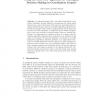8 search results - page 1 / 2 » Global Approximations for Principal Agent Theory |
TSMC
2008
13 years 4 months ago
2008
Learning Automata (LA) were recently shown to be valuable tools for designing Multi-Agent Reinforcement Learning algorithms. One of the principal contributions of LA theory is tha...
TCS
2010
13 years 3 months ago
2010
The concept of stigmergy provides a simple framework for interaction and coordination in multi-agent systems. However, determining the global system behavior that will arise from ...
STOC
2010
ACM
13 years 9 months ago
2010
ACM
We study the classic mathematical economics problem of Bayesian optimal mechanism design where a principal aims to optimize expected revenue when allocating resources to self-inte...
ATAL
2007
Springer
13 years 11 months ago
2007
Springer
Distributed Partially Observable Markov Decision Problems (Distributed POMDPs) are a popular approach for modeling multi-agent systems acting in uncertain domains. Given the signi...
ROBOCUP
2005
Springer
13 years 10 months ago
2005
Springer
Abstract. Coordination graphs offer a tractable framework for cooperative multiagent decision making by decomposing the global payoff function into a sum of local terms. Each age...

